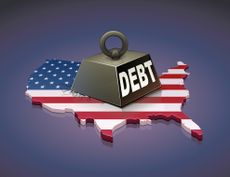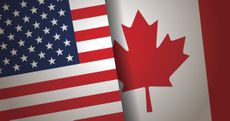TikTok Ban Winners and Social Media Changes: Kiplinger Economic Forecasts
Our analysis of the massive social media cross-platform shake-ups.
- (opens in new tab)
- (opens in new tab)
- (opens in new tab)
- Newsletter sign up Newsletter

Social media platforms Facebook, Instagram, TikTok, Twitter and LinkedIn are huge parts of our lives, but they are huge businesses in their own right that play a big part in the economy. Our highly knowledgeable Kiplinger Letter team will update you on all the important developments in this market (Get a free issue of The Kiplinger Letter or subscribe). Here’s the latest forecast…
One way to identify the biggest winners from a potential TikTok ban (opens in new tab) is to look at other platforms popular with TikTok users.
Instagram is the most popular, with 73% of TikTok’s U.S. users also using Meta’s (META (opens in new tab)) widely popular photo-sharing app, according to December 2022 data from eMarketer (opens in new tab).

Sign up for Kiplinger’s Free E-Newsletters
Profit and prosper with the best of expert advice on investing, taxes, retirement, personal finance and more - straight to your e-mail.
Profit and prosper with the best of expert advice - straight to your e-mail.
Meta-owned Facebook comes in second, with 64%, followed by Pinterest (55%), Snapchat (53%) and LinkedIn (42%). Facebook, Instagram and Snapchat come closest to replicating TikTok’s short, viral video posts. Alphabet’s (GOOGL (opens in new tab)) YouTube also has very similar short videos. In fact, many TikTok videos are shared on other social media sites, showing the power of the China-owned app.
Though TikTok users would be irked by a U.S. ban or other crackdown, there are plenty of alternatives that would snap up consumers’ time. Ad dollars would likely follow, as would many popular creators who post videos.
LinkedIn changes: good news for employers
Hiring managers will benefit from LinkedIn’s new free verification process. It should make it easier to vet candidates because both a user’s identity and current place of employment will be authenticated via a government-issued ID and a work email address.
The experiment is powered by tech from Microsoft (MSFT (opens in new tab)), LinkedIn’s parent company, to ensure profiles are genuine and to fend off scams and identify fraud. Boosting trust and security on the 900 million-user website will push other social networks to follow suit.
Facebook’s verification tool
Meta-owned Facebook has a similar tool that runs $12 per month for users to verify their identity and get additional features.
Meanwhile, Twitter’s changes to its "blue tick" verification system are drawing criticism, as the company overhauls the old method of authentication and pushes paid versions. It may get harder to distinguish who is genuinely authenticated and trustworthy, a potential problem for local governments and others that use Twitter to communicate.
This forecast first appeared in the The Kiplinger Letter. Since 1925, the Letter has helped millions of business executives and investors profit by providing reliable forecasts on business and the economy, as well as what to expect from Washington. Get a free issue of The Kiplinger Letter or subscribe.
Read more
- Mystery Shopping Scam hits LinkedIn
- Can You Trust TikTok's Advice?
- Meta Warns of ChatGPT Scams on Facebook and Instagram
- Snap IPO: The Next Facebook or Another Twitter?
-
-
 Travel demand and delays to soar, so plan ahead: Kiplinger Economic Forecasts
Travel demand and delays to soar, so plan ahead: Kiplinger Economic ForecastsEconomic Forecasts Travel demand and delays to soar, so plan ahead: Kiplinger Economic Forecasts
By Sean Lengell • Published
-
 To Afford Retirement, Take Inspiration from ‘The Golden Girls’
To Afford Retirement, Take Inspiration from ‘The Golden Girls’Roommates, a part-time job and renting out your vacation home could be ways to save early in retirement to cover more expensive years later on.
By Erin Wood, CFP®, CRPC®, FBSⓇ • Published
-
 Travel demand and delays to soar, so plan ahead: Kiplinger Economic Forecasts
Travel demand and delays to soar, so plan ahead: Kiplinger Economic ForecastsEconomic Forecasts Travel demand and delays to soar, so plan ahead: Kiplinger Economic Forecasts
By Sean Lengell • Published
-
 SpaceX in Good Shape Despite Test Flight: Kiplinger Economic Forecasts
SpaceX in Good Shape Despite Test Flight: Kiplinger Economic ForecastsEconomic Forecasts SpaceX in good shape despite test flight concerns: Kiplinger Economic Forecasts.
By John Miley • Published
-
 Medicare Drug Price Negotiations Latest: Kiplinger Economic Forecasts
Medicare Drug Price Negotiations Latest: Kiplinger Economic ForecastsEconomic Forecasts Medicare drug price negotiations: Early signs have emerged of how these key talks will be handled.
By Matthew Housiaux • Published
-
 Virgin Orbit Failure Casts Cloud Over Space Voyages: Kiplinger Economic Forecasts
Virgin Orbit Failure Casts Cloud Over Space Voyages: Kiplinger Economic ForecastsEconomic Forecasts Virgin Orbit failure casts a cloud over space voyages but SpaceX could fill the void.
By Letter Editors • Published
-
 Debt Ceiling Will Be Averted but It Won’t Be Easy: Kiplinger Economic Forecasts
Debt Ceiling Will Be Averted but It Won’t Be Easy: Kiplinger Economic ForecastsEconomic Forecasts Debt Ceiling Will Be Averted but It Won’t Be Easy: Kiplinger Economic Forecasts
By Sean Lengell • Published
-
 China to Benefit from U.S. Semiconductor Export Controls: Kiplinger Economic Forecasts
China to Benefit from U.S. Semiconductor Export Controls: Kiplinger Economic ForecastsEconomic Forecasts Washington wants to limit the use of more advanced tech overseas, which could fuel Beijing’s lower-tech sector
By Andrew Tanzer • Published
-
 Food Prices Fell in March But Are Still Way Up Year-on-Year: Kiplinger Economic Forecasts
Food Prices Fell in March But Are Still Way Up Year-on-Year: Kiplinger Economic ForecastsEconomic Forecasts Food Prices Fell in March But Are Still Way Up Year-on-Year: Kiplinger Economic Forecasts
By Matthew Housiaux • Published
-
 Canada’s Economic Slowdown Could Be Good for the U.S.: Kiplinger Economic Forecasts
Canada’s Economic Slowdown Could Be Good for the U.S.: Kiplinger Economic ForecastsEconomic Forecasts Canada’s Economic Slowdown Could Be Good for the U.S.: Kiplinger Economic Forecasts
By Rodrigo Sermeño • Published








